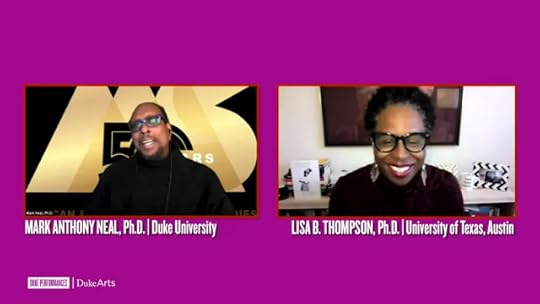Mark Anthony Neal's Blog, page 193
July 22, 2021
John Carlos Recalls Impact of His Olympic Protest in 1968

'On the eve of the 2021 Olympic opening ceremonies in Tokyo, new rules about protesting at the games are coming under intense scrutiny. Jonathan Vigliotti spoke John Carlos, to a man whose protest with Tommie Smith at the 1968 Olympics in Mexico City changed history.' -- CBS This Morning
July 21, 2021
The Rise Of The Four-Day Work Week
'In early 2021, the CEO of the crowdfunding website Kickstarter, Aziz Hasan, announced that the company will be piloting a four-day work week in 2022. The schedule consists of 32 working hours per week rather than 40. But is a four-day work week possible for every type of workplace? And what would it take for the idea to really catch on? Alex Soojung-Kim Pang, Natalie Nagele, and Benjamin Hunnicutt join 1A for the discussion.'
One Hundred: The Ed Gordon Podcast with Jimmy Jam & Terry Lewis

'In this episode One Hundred, host Ed Gordon talks with one of the most prolific musical teams of all time, Jam & Lewis. Jimmy Jam and Terry Lewis, as a combination writing and producing team, have more number one records than anyone in the history of music. They discuss their journey from sidemen in Prince created band, The Time to giving hit music to some the biggest singers in the business, including: New Edition, Usher, George Michael, Boy II Men, Mary J Blige, Michael Jackson and, of course, his sister Janet. They also talk about their debut album, as artists, that was 35 years in the making.'
Sound Expertise: Freedom Singing at the March on Washington with Tammy L. Kernodle

'Though often overlooked in mainstream histories, the voices of Black women were central to the March on Washington for Jobs and Freedom in August 1963. And those voices included some of the greatest musicians of the time: Odetta, Mahalia Jackson, Camilla Williams. These women, and the political significance of the spirituals they sang, are the subject of this week’s episode: a conversation with the musicologist Tammy L. Kernodle about the wide-ranging role of music, and the fractious political coalitions it represented, at the 1963 March on Washington. Tammy L. Kernodle is Professor of Musicology at Miami University in Ohio.'
IndieWire's Filmmaker Toolkit: 'P-Valley' Creator Katori Hall

'On this episode of IndieWire's Filmmaker Toolkit, the P-Valley showrunner Katori Hall, talks about growing up in Memphis and how going to strip clubs informed how her Starz TV series celebrates the culture and art form of stripping. Hall discussed how she was inspired by Barry Jenkins’ Moonlight and used color light to capture the beauty of her casts’ dark skin tones. The playwright-turned-TV creator also talked about her experience of being a first time showrunner, what she is building off for Season 2, where she’ll step into the director’s chair for the first time.'
July 20, 2021
Arthur Jafe and Steve Coleman on Quantum Intentionality, Black Intonation, and Charlie Parker

'On the eve of the opening of “The Message: New Media Works,” and for the first time in a public forum, Arthur Jafa was joined by renowned jazz musician Steve Coleman to discuss the intersections of their practices over the last 30 years. Coleman is among a selection of musicians participating in Listening Session, an experimental performance series presented in conjunction with Jafa’s Serpentine Gallery exhibition, “A Series of Utterly Improbable, Yet Extraordinary Renditions”.'
AJ and Steve on Quantum Intentionality, Black Intonation, and Charlie Parker (from Love is the Message, An Evening with Arthur J from liquid blackness on Vimeo.
Duke Arts presents - In Conversation: Black Theatre Matters with Lisa B. Thompson

'In Conversation continues with “Black Theatre Matters,” a discussion with playwright and scholar Lisa B. Thompson. As the real-life drama of the Black Lives Matter movement unfolds around the country and the world, Thompson will discuss the continued relevance of Black theatre to the movement. Moderated by Mark Anthony Neal, James B. Duke Distinguished Professor of African and African American Studies.'
Duke Arts presents - In Conversation: Black Theatre Matters from Duke Arts on Vimeo.
Filmmaker Q&A | My Name is Pauli Murray

'Q&A with co-directors Julie Cohen and Betsy West, producer Talleah McMahon, and Pauli Murray Center director Barbara Lau, moderated by Teka Selman for 2021 Full Frame Festival film My Name is Pauli Murray. This luminous film examines the legacy of Pauli Murray. A trailblazing lawyer, activist, poet, and priest, Murray’s life was dedicated to effecting change in America, especially around issues of race and gender equity. The experience of growing up Black in the segregated South—having moved to Durham, North Carolina, as a child—shaped Murray’s resolve to question and challenge cultural norms.'
Filmmaker Q&A | MY NAME IS PAULI MURRAY from Full Frame Documentary Film Fest on Vimeo.
Texas Democrats Are Getting into ‘Good Trouble’ by Ben Jealous

Texas Democrats Are Getting into ‘Good Trouble’
by Ben Jealous | @BenJealous | NewBlackMan (in Exile)
One year after the death of the great civil rights icon John Lewis, a group of Texas Democratic lawmakers is following Lewis’s lifelong call for people to make “good trouble” and “necessary trouble” to secure equality and justice for all. Congressional Democrats should bring the same level of commitment to resisting and overturning a new wave of voting restrictions that voting rights activist Stacey Abrams has labeled “Jim Crow 2.0.”
Here’s why dozens of Texas lawmakers are in Washington, D.C. this week.
Texas is the latest Republican-run state where legislators and the governor are trying to impose new voting restrictions—banning drive-through and 24-hour early voting, restricting distribution of absentee ballots, imposing new voter ID provisions—that they hope will make it harder for Democrats to win future elections. Their voter suppression laws are aimed at Black and brown voters and others more likely to support Democratic candidates.
Republican officials are also trying to make former President Donald Trump happy by giving credibility to his false claims that the 2020 election was stolen from him. They’re using his lies about “election fraud” and “election integrity” to justify new restrictive voting rules.
In Texas, Republicans control the state House and Senate. And hard-right Gov. Gregg Abbott is eager to do Trump’s bidding. Back in May, Texas Republicans tried to push their election bill through the House just before the close of the legislative session. Because the Texas House is required to have two-thirds of its members present to conduct official business, Democratic legislators stopped the bill from passing by walking out of the chamber.
But Gov. Abbott is so set on getting his new voting law that he ordered legislators to come back into session this month to push it through. To prevent the state’s Republicans from forcing new voting restrictions into law, more than 50 Democratic legislators left the state.
Gov. Abbott and Republican Senate leaders have threatened lawmakers with arrest to try to force them to attend the session. And he has said he will keep calling special sessions until he gets his way. That’s why the Texas legislators came to Washington, D.C. They brought an urgent message to members of Congress: the only way to protect voters from voter suppression at the state level is to pass national voting rights legislation.
The House of Representatives has previously passed the For the People Act, which would reverse many new voting restrictions and includes a number of priorities specifically outlined by John Lewis during his lifetime, and the John Lewis Voting Rights Act, which would help prevent future voter suppression efforts from taking effect. Both are essential to protect democracy and voting rights. But right now Senate Republicans are using the filibuster to block the For the People Act, and they could do the same to the VRA.
President Joe Biden has just made a strong speech in defense of voting rights. He denounced new voter suppression efforts. And he called for the Senate to pass the For the People Act and the John Lewis Voting Rights Act.
I am grateful that President Biden has called attention to the urgent need for congressional action. Now we need him to use his leadership to get voting rights legislation through the Senate. And if Republicans continue to block it using a filibuster, he must work with Senate leaders to break through that obstruction.
John Lewis nearly died in the struggle to pass the national Voting Rights Act. He dedicated his career in Congress to defending it. I am steeling myself for the disgust I will feel when Republican officials praise him on the anniversary of his death at the same time they are undermining the cause to which he devoted his life.
Texas Democrats are honoring John Lewis by making good and necessary trouble. It is time for Democrats in Washington, and any Republicans committed more to country than party, to do the same.
***
Ben Jealous serves as president of People For the American Way. Jealous has decades of experience as a leader, coalition builder, campaigner for social justice and seasoned nonprofit executive. In 2008, he was chosen as the youngest-ever president and CEO of the NAACP. He is a graduate of Columbia University and Oxford, where he was a Rhodes Scholar, and he has taught at Princeton and the University of Pennsylvania.
@font-face {font-family:Helvetica; panose-1:0 0 0 0 0 0 0 0 0 0; mso-font-charset:0; mso-generic-font-family:auto; mso-font-pitch:variable; mso-font-signature:-536870145 1342208091 0 0 415 0;}@font-face {font-family:"Cambria Math"; panose-1:2 4 5 3 5 4 6 3 2 4; mso-font-charset:0; mso-generic-font-family:roman; mso-font-pitch:variable; mso-font-signature:3 0 0 0 1 0;}@font-face {font-family:Calibri; panose-1:2 15 5 2 2 2 4 3 2 4; mso-font-charset:0; mso-generic-font-family:swiss; mso-font-pitch:variable; mso-font-signature:-536859905 -1073732485 9 0 511 0;}p.MsoNormal, li.MsoNormal, div.MsoNormal {mso-style-unhide:no; mso-style-qformat:yes; mso-style-parent:""; margin:0in; margin-bottom:.0001pt; mso-pagination:widow-orphan; font-size:12.0pt; font-family:"Calibri",sans-serif; mso-ascii-font-family:Calibri; mso-ascii-theme-font:minor-latin; mso-fareast-font-family:Calibri; mso-fareast-theme-font:minor-latin; mso-hansi-font-family:Calibri; mso-hansi-theme-font:minor-latin; mso-bidi-font-family:"Times New Roman"; mso-bidi-theme-font:minor-bidi;}.MsoChpDefault {mso-style-type:export-only; mso-default-props:yes; font-family:"Calibri",sans-serif; mso-ascii-font-family:Calibri; mso-ascii-theme-font:minor-latin; mso-fareast-font-family:Calibri; mso-fareast-theme-font:minor-latin; mso-hansi-font-family:Calibri; mso-hansi-theme-font:minor-latin; mso-bidi-font-family:"Times New Roman"; mso-bidi-theme-font:minor-bidi;}div.WordSection1 {page:WordSection1;}
July 19, 2021
The Golden Arches in Black America

'Marcia Chatelain, a historian at Georgetown, recently won the Pulitzer Prize for History for her book Franchise: The Golden Arches in Black America. Chatelain looks at how McDonald’s leveraged the social upheaval of the nineteen-sixties to gain a permanent foothold in Black communities across the country. McDonald’s strategically positioned franchise ownership as an economic goal for Black entrepreneurs. Black franchisees, she notes, have navigated the economic promise and the pitfalls of that corporate relationship, while the wages for fast-food workers, who are disproportionately Black and Latino, have remained notoriously low.' -- The New Yorker Radio Hour
Mark Anthony Neal's Blog
- Mark Anthony Neal's profile
- 30 followers




